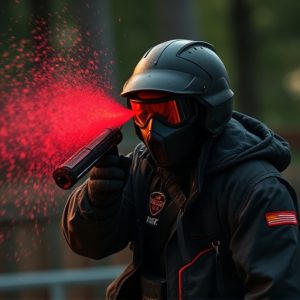Decoding Pepper Spray’s Impact on Vision: A Comprehensive Guide to OC Spray Effects and Safety
Peer spray, known as OC (oleoresin capsicum) spray, is a non-lethal self-defense tool that temporar…….
Peer spray, known as OC (oleoresin capsicum) spray, is a non-lethal self-defense tool that temporarily incapacitates attackers by causing severe irritation to the eyes, skin, and respiratory system. The active ingredient, capsaicin, triggers intense pain responses when it comes into contact with mucous membranes, leading to immediate vision impairment characterized by tears, acute eye pain, blurred vision, and temporary blindness due to reflexive eyelid closure. This condition typically subsides within 30 to 45 minutes, providing an opportunity for escape. It is crucial to understand that while pepper spray can cause temporary blindness under specific conditions, it does not result in permanent eye damage. The effectiveness of pepper spray depends on factors such as concentration, quantity used, proximity, environmental conditions like wind, and individual differences in sensitivity and physiology. Recognizing these variables is essential for responsible use by both law enforcement officers and individuals in self-defense situations.
OC spray, commonly known as pepper spray, is a potent self-defense tool that incapacitates assailants by causing intense irritation. This article delves into the science of OC spray and its impact on vision, addressing questions like “Can pepper spray blind you?” We explore the mechanism that triggers intense pain and temporary incapacitation in the eyes and respiratory system, providing clarity on how it induces a state akin to temporary blindness. Understanding the factors that influence its effects is crucial for recognizing its potential in self-defense scenarios. Additionally, we examine safety precautions and legal considerations essential for responsible use. With an emphasis on “can pepper spray blind you,” this comprehensive guide aims to educate readers on the effects of OC spray, ensuring they are well-informed about its capabilities and limitations.
Understanding OC Spray: The Science Behind Pepper Spray and Its Effects on Vision
Can Pepper Spray Cause Temporary Blindness? An In-Depth Analysis of its Visual Impact
Pepper spray, a commonly used self-defense tool, is formulated with capsaicinoid compounds derived from hot peppers. The primary purpose of this spray is to temporarily incapacitate an assailant by causing intense irritation upon contact with the eyes, skin, or respiratory system. When pepper spray comes into direct contact with the mucous membranes of the eyes, it can cause a sensation so severe that the individual may instinctively close their eyelids tightly, leading to temporary blindness. This condition is not a result of actual damage to the eyes but stems from the overwhelming stimulation caused by the capsaicinoid agents. The effects can last from a few minutes to half an hour, depending on various factors such as wind conditions, distance of exposure, and the potency of the spray. It’s important for users to understand that while pepper spray is designed to be an effective deterrent, it should only be used in self-defense situations where personal safety is at immediate risk. Proper training and familiarity with local laws are essential for safe handling and use. The visual impact of pepper spray is a potent one, but it does not result in permanent harm to the eyes; rather, it creates a protective window of opportunity for individuals to escape from potentially harmful situations.
The Mechanism of Action: How Pepper Spray Affects the Eyes and Respiratory System
OC (Oleoresin Capsicum) spray, commonly known as pepper spray, is a non-lethal self-defense tool that incapacitates an attacker by causing intense irritation to the eyes, skin, and respiratory system. Upon deployment, the active component of the spray, capsaicin, penetrates the mucous membranes. This compound interacts with the sensory neurons responsible for detecting noxious heat, triggering a cascade of neurogenic pain responses. The effects are rapid and can lead to immediate tears, intense eye pain, blurred vision, and short-term blindness as the eyes involuntarily close due to the severe discomfort. The impact on the respiratory system includes coughing, difficulty breathing, and a burning sensation in the lungs and throat. These reactions are the body’s attempt to expel the irritant. The effects of OC spray can last from 30 to 45 minutes, providing an individual with a temporary window to escape from a dangerous situation. Can pepper spray blind you temporarily? Yes, the intense stimulation of the eyes by the spray can cause lacrimation, miosis (constriction of the pupil), and corneal damage that can result in significant pain and temporary blindness until the effects subside. It’s crucial to use such sprays responsibly and with proper training due to their potency and potential for misuse.
Factors Influencing the Intensity of OC Spray's Effects on Vision
OC (Oleoresin Capsicum) spray, commonly known as pepper spray, is a law enforcement tool and a personal defense mechanism that can temporarily incapacitate an assailant. The intensity of OC spray’s effects on vision is influenced by several factors, which include the concentration of the active ingredient, the amount of spray deployed, the proximity to the target’s eyes, environmental conditions such as wind and lighting, and individual differences in eye sensitivity and physiology.
The concentration of the OC spray directly correlates with its potency; higher concentrations can cause more severe irritation, potentially leading to temporary blindness. The amount used also plays a role; a larger dose can result in prolonged effects. Proximity is another critical factor; spraying from close range increases the likelihood of the spray’s active components coming into direct contact with the eyes, enhancing its effects. Environmental factors such as wind can either disperse the spray too widely, reducing its effectiveness, or focus it onto the target, intensifying its impact. Additionally, individual differences in eye sensitivity and anatomy mean that some individuals may experience more severe reactions than others. Understanding these variables is crucial for effective use of OC spray and for recognizing its potential to cause a temporary loss of vision, as the question often arises: “Can pepper spray blind you?” The answer lies in the interplay of these factors and the individual’s unique response to the irritant.


